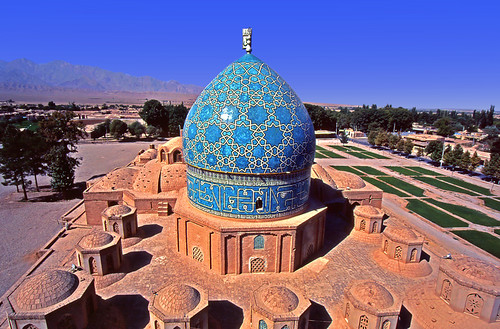 1960s Iran - Website for this image
1960s Iran - Website for this imageOn 16 February 2012, in congressional hearings, US Defense Secretary Leon Panetta said that Iran has not decided to develop an atomic bomb.
Panetta: No Iranian nukes
"The intelligence does not show that they've made the decision to proceed with developing a nuclear weapon," Panetta said.
The US, however, continues to apply sanctions on Iran.
The CIA and MI6 put the Ayatollahs into power to weaken Iran and keep it backward.
They have succeeded.
 Boyscouts in 1960s Iran
Boyscouts in 1960s IranIran has recently made an announcement about nuclear energy development.
US State Department spokeswoman Victoria Nuland said the announcement was 'hyped' for a domestic audience.
"Our view on this is that it’s not terribly new and it’s not terribly impressive," she said.
 The Shah was toppled by the CIA and MI6 partly because he was modernising Iran, and cutting down on the heroin trade.
The Shah was toppled by the CIA and MI6 partly because he was modernising Iran, and cutting down on the heroin trade.The well informed Mostaque Ali (Further clarification after "lock-step" faux pas.) comments:
"Mullah Iran has a track record of boasting about alleged technological achievements that don't exist going back to the 1980's
"There are various domestic psychological reasons for this.
"The Mullahs came to power in 1979, as latter day Luddites (people opposed to modern machinery) at the behest of the USA/UK
"The mullahs shut down the ... Shah's ambitious nuclear program of $90 billion ...which would be $360 billion at today's prices (2012).
"Though the mullahs have restarted the civilian nuclear program begun by the Shah, and attempted to complete nuclear power stations begun in the 1970's by the Shah, there is no way the mullahs are going to invest the huge amounts of capital investment that the Shah promised.
"Maybe only 10% of what the Shah would have spent, in the next 10-20 years.
"Why?
(i) "The Mullahs are Luddites who aren't into technical modernization of the Iranian economy, which might produce a very large prosperous middle class.
"Instead the mullahs have been busy encouraging the technical class/middle class leave Iran - up to 5,000,000 of them.
"The mullahs see the middle class as threats to their power, and have thus allied themselves with the villagers and urban working class, at least through sloganism.
(ii) "The fear that Iran might run out of oil ... has passed. Hence the urgency to build alternative power no longer exists."

Iran by Sergio Pessolano
Professor Bernard Lewis, at the Bilderberg Meeting in Baden, Austria, on April 27-29, 1979 "proposed the fragmentation and balkanization of Iran along regional, ethnic and linguistic lines."
On 27 December 2009, SELIG S. HARRISON, at the new York Times, wrote about Tehran's Biggest Fear.
According to Harrison, the biggest threat to the ruling ayatollahs and generals in Iran comes from the separatist groups in Kurdish, Baluch, Azeri and Arab ethnic minority regions that make up some 44 percent of Iran's population.
During the Bush administration, the plan was "limited covert action carried out by proxy, in the case of the Baluch, through Pakistan’s Inter-Services Intelligence Directorate or, I.S.I., and in the case of the Kurds by the C.I.A. in cooperation with Israel’s Mossad."
The C.I.A. provided weapons aid and training to the main Kurdish rebel group in Iran, according to U.S. journalists, Jon Lee Anderson and Seymour Hersh of the New Yorker and Borzou Daragahi of the Los Angeles Times.
The Arab separatists live in a province which produces 80 percent of Iran's crude oil revenue.
aangirfan: CHANGE IS COMING TO IRAN







No comments:
Post a Comment